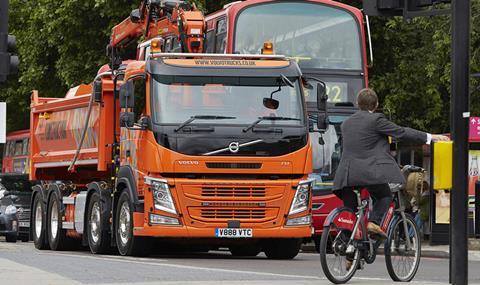
As work begins this week to close off major routes in London to lorries, cars, vans, hauliers are calling for lorries to be exempt from the ban.
The new measures, announced by Mayor Sadiq Khan last week, aim to ensure social distancing during the Covid-19 pandemic by giving more road space to pedestrian and cyclists.
Under the initiative, main streets between London Bridge and Shoreditch, Euston and Waterloo, and Old Street and Holborn, will be limited to buses, pedestrians and cyclists.
Similar restrictions on minor roads in the area will also be implemented. Cars and lorries may also be banned from Waterloo Bridge and London Bridge and all congestion charging has been reintroduced today (18 May).
RHA managing director of policy Rod McKenzie said the measures “feel anti-car, anti-lorry and anti-van and yet all these methods of transport are essential for economic recovery – so do not punish one group at the expense of another.”
RHA chief executive, Richard Burnett said in a letter to parliamentary under-secretary of state, Baroness Vere that squeezing vehicles into less space will clog up the roads – harming the environment and slowing productivity.
“All government communication about this initiative overlooks the need to accommodate freight activities," he said. "I have serious concerns over the potential for the wholesale removal of capacity that the guidance promotes.”
The RHA is concerned that the government is promoting restrictions on vehicles and removal of parking bays in the longer term, and warned that poor local interpretation will impose even harder conditions on firms collecting and delivering vital goods.
The FTA called for any temporary reallocation of road space for walking and cycling during the pandemic to be flexible with kerbside access for deliveries maintained and access to residential streets remaining open to ensure home deliveries.
Hauliers slammed the Mayor’s decision to close off key routes to freight, with some calling for lorries to be given the same access as buses.
Trevor Edden, managing director of Banbury-based TWE Haulage said: “Are they trying to cripple the people and companies who live and operate within the zone. I can understand it applying to cars but not lorries, they are only delivering what someone needs.”
He added: “Delivering into London is already a nightmare but if this means hauliers are running an hour and a half longer than necessary as there’s more roads blocked off to them, it will just increase emissions. We need to be guaranteed access so we can deliver essential goods.”
Paul Johnson, MD of Transervice Express Transport, expressed concern that similar schemes may be introduced in towns and cities around the country without planning for freight deliveries.
“I am not against the idea of greater bike use but without proper planning we will get empty cycle lanes with cars queuing alongside and even more pollution created.
“By all means look at restricting cars in London but why ban freight, which is making essential deliveries? That will only slow down the recovery.”
Simon Munk, infrastructure campaigner at London Cycling Campaign said congestion in London “isn’t caused by too many of these schemes, but too few” adding that hauliers will benefit from more cycling schemes.
“We do need to consider carefully construction, logistics, freight, servicing and the impacts of these changes and for some journeys, an HGV or a van is utterly necessary, and for others a car or taxi.
“But what’s interesting is that across Europe, we see cities, including ones of similar size and weather to London, where people cycling, cycle tracks and pedestrian areas coexist with deliveries and construction.”














